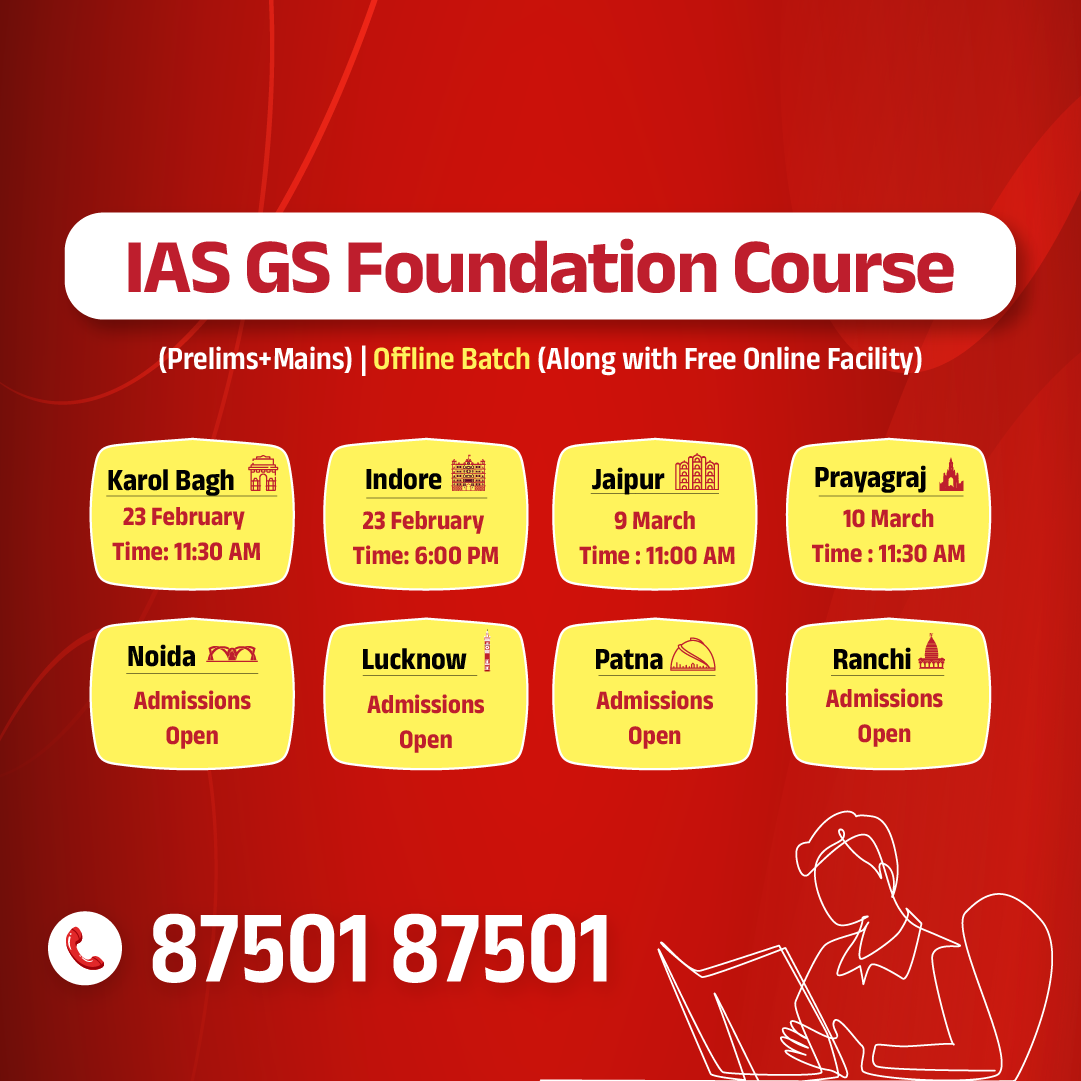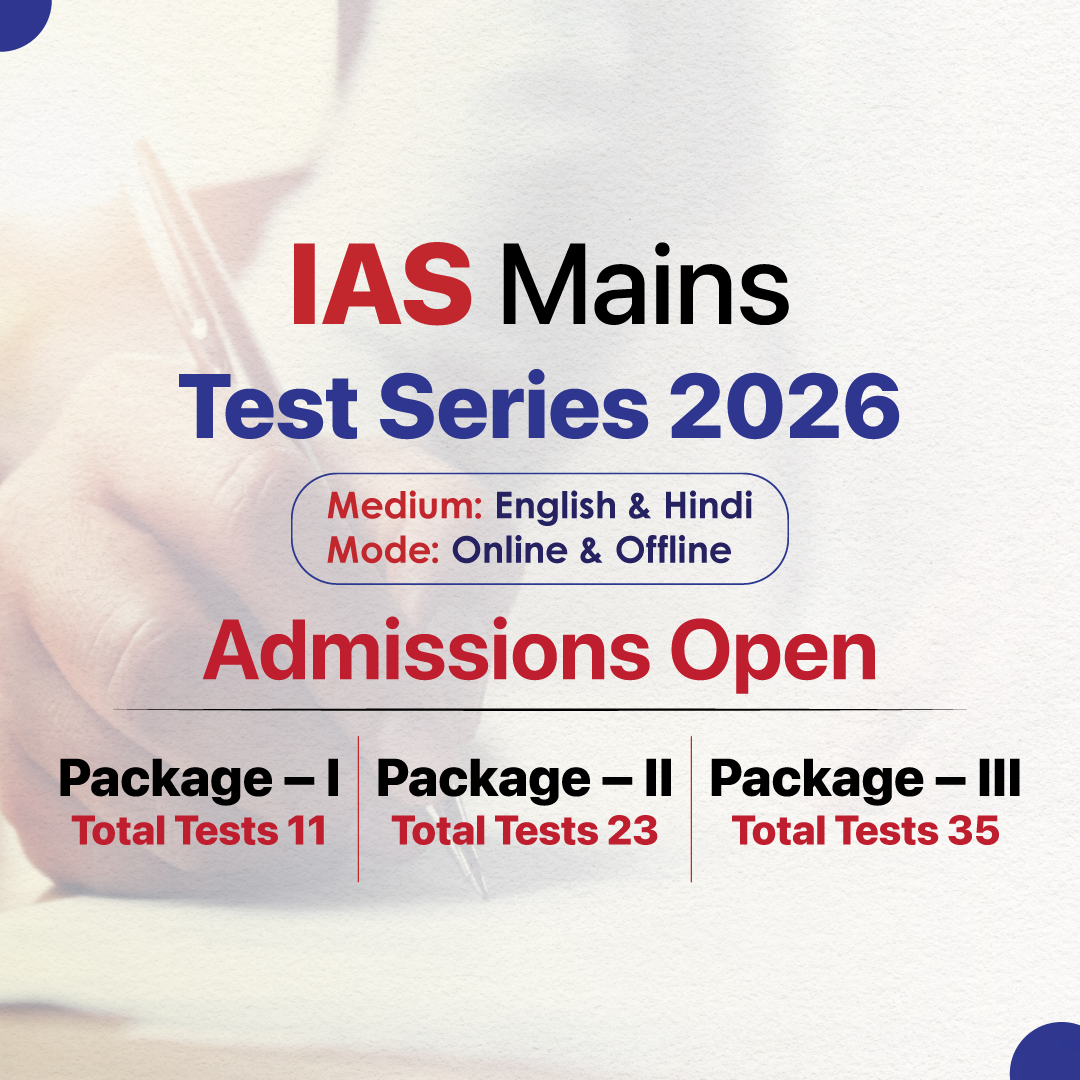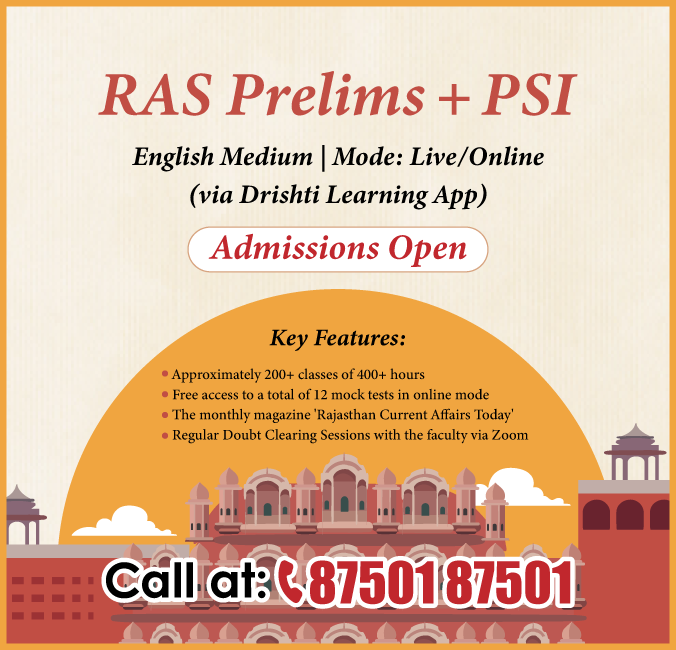Uttar Pradesh Switch to Hindi
NSSTA Foundation Day 2026
Why in News?
The National Statistical Systems Training Academy (NSSTA), a premier Central Training Institute under the Ministry of Statistics and Programme Implementation (MoSPI), celebrated its 18th Foundation Day on 13th February 2026 at Greater Noida.
Key Points:
- Theme: "Reimagining Capacity Building for Official Statistics to achieve the vision of Viksit Bharat@2047".
- Strengthening System: The occasion marks eighteen years of the Academy’s dedicated contribution to strengthening India’s statistical systems and promoting evidence-based governance through sustained capacity building.
- Digital Data Lab Inauguration: A major milestone was the inauguration of the Digital Data Lab, designed to promote digital skilling, immersive training, and hands-on exposure to tools like AI/ML and big data analytics.
- Data as the "Fifth Factor of Production": Data is now recognized as a strategic asset, serving as the raw material for Artificial Intelligence and a critical component of high-level decision-making.
- About NSSTA:Founded on 13th February 2009 in Greater Noida, Uttar Pradesh.
- Primary Mandate: To create a pool of trained manpower in theoretical and applied statistics for the Indian Statistical Service (ISS) and the Subordinate Statistical Service (SSS).
- Institutional Collaboration: NSSTA partners with institutes like IITs, IIMs, ISI, and NITI Aayog, as well as international bodies like the World Bank and IMF, to align Indian methodologies with global best practices.
National Current Affairs Switch to Hindi
PM Inaugurates Seva Teerth and Kartavya Bhavan in New Delhi
Why in News?
The Prime Minister of India Narendra Modi, inaugurated Seva Teerth and Kartavya Bhavan in New Delhi in February 2026, marking a significant milestone in the modernisation of India’s central administrative infrastructure.
Key Points:
- Inauguration: Seva Teerth has been inaugurated as the new complex to house the Prime Minister’s Office (PMO), symbolising a shift towards service-oriented governance.
- Kartavya Bhavan accommodates key Union Ministries to improve coordination and administrative efficiency.
- Relocation: The PMO has shifted from the historic South Block to Seva Teerth.
- The new buildings are part of the broader Central Vista project aimed at modernising India’s administrative infrastructure.
- Significance: The complexes are built as energy-efficient, eco-friendly structures with green building standards and modern safety features.
- The new infrastructure is designed to enhance transparency, accessibility, and seamless public interface in governance.
- Symbolic Shift from Colonial Legacy: The move represents a transition from colonial-era administrative buildings to modern, India-centric governance spaces aligned with the vision of ‘Viksit Bharat’.
| Read More: PMO, Central Vista project, Viksit Bharat |
National Current Affairs Switch to Hindi
Sthree Suraksha Scheme in Kerala
Why in News?
The Government of Kerala has launched the Sthree Suraksha Scheme to provide monthly financial assistance to unemployed women and transgender women in the state.
Key Points:
- Scheme: The Sthree Suraksha Scheme is a state-level social security initiative designed to provide financial assistance to economically vulnerable unemployed women and transgender women.
- Eligible beneficiaries receive ₹1,000 per month as direct financial assistance, credited to their bank accounts through the state’s social security pension system.
- Target Group: The scheme primarily benefits homemakers and unemployed women who are not covered under any existing social welfare pension schemes.
- Eligibility: Applicants must be permanent residents of Kerala, aged between 35 and 60 years, unemployed, belonging to Antyodaya Anna Yojana (Yellow Card) or Priority Household (Pink Card) ration card categories, and should not be beneficiaries of other welfare pensions.
- Applications are submitted through Local Self-Government Institutions (Panchayats, Municipalities, and Corporations) and are subject to verification by local authorities.
- Mode of Transfer: Financial assistance is provided through Direct Benefit Transfer (DBT) to ensure transparency and timely disbursement.
- The scheme is funded by the Government of Kerala as part of its social security and gender welfare initiatives.
- Inclusion of Transgender: Their inclusion reflects the state’s commitment to social justice and inclusive welfare policies.
- Mechanism: Beneficiary lists are verified at the local body level to prevent duplication and ensure that only eligible applicants receive benefits.
- Significance: The scheme strengthens Kerala’s social protection framework, promotes women’s economic security, and contributes to gender-inclusive development.
| Read More: Transgender, Direct Benefit Transfer |
National Current Affairs Switch to Hindi
PNB Soldierathon 2026
Why in News?
Punjab National Bank has announced the PNB Soldierathon 2026, a nationwide marathon event as part of celebrations leading up to its 132nd Foundation Day.
Key Points:
- Event: PNB Soldierathon 2026 is the second edition of the bank’s flagship marathon event, aimed at promoting fitness, discipline, and national pride.
- The PNB Soldierathon 2026 marathon is scheduled to be held in April 2026.
- Organised by: The event has been announced by Punjab National Bank at its corporate office in Dwarka, New Delhi.
- Theme: “Run with Soldiers, Run for Soldiers” highlights the marathon’s focus on honouring the Indian Armed Forces and strengthening ties between citizens and defence personnel.
- Foundation Day: The announcement marks the commencement of celebrations for PNB’s 132nd Foundation Day, reflecting the bank’s legacy and social engagement role.
- During the pre-launch, the official theme, event name, marathon T-shirt, and medals were unveiled as part of the preparations.
- Objective: The marathon aims to promote fitness, healthy lifestyle, national unity, and a civil-military connect, bringing together soldiers, veterans, youth, and citizens across India.
- By combining athletic participation with patriotic symbolism, the Soldierathon reinforces PNB’s broader mission of community engagement, social responsibility, and nation-building.
National Current Affairs Switch to Hindi
India–Thailand Joint In-Situ Air Exercise
Why in News?
The Indian Air Force and the Royal Thai Air Force are undertaking a joint in-situ air exercise aimed at boosting operational coordination and interoperability between the two air forces.
Key Points:
- Exercise: An in-situ air exercise refers to a joint training operation conducted under realistic flight and combat-relevant conditions.
- Allowing forces to operate together near operational environments rather than in isolated training simulations.
- Indian Air Force Assets: India has deployed several of its frontline aerial assets, including Su-30MKI fighter aircraft, Airborne Warning and Control System (AWACS), Airborne Early Warning & Control (AEW&C) platforms, and IL-78 mid-air refuelling aircraft.
- The Royal Thai Air Force is participating with its Gripen multirole fighter aircraft, facilitating joint flight operations and tactical coordination.
- Objective: The primary aim of the exercise is to enhance operational coordination, interoperability, and mutual understanding in aerial operations between both air forces.
- Strategic Significance: The exercise highlights expanding defence cooperation between India and Thailand within the broader framework of India’s Act East Policy and Thailand’s Act West Policy.
- Benefits: Involvement of force multipliers such as Airborne Warning and Control System and aerial refuelling platforms demonstrates advanced integration of surveillance, command and control, and extended mission endurance capabilities.
| Read More: Act East Policy |
National Current Affairs Switch to Hindi
WHO Prequalifies India-Made Novel Oral Polio Vaccine (nOPV2)
Why in News?
The World Health Organization prequalified a novel oral polio vaccine type 2 (nOPV2),a breakthrough in stopping polio outbreaks more sustainably with stronger global vaccine supply.
Key Points:
- Manufacturing: This milestone is particularly significant for India as the vaccine is manufactured by Biological E. Limited (BioE), a Hyderabad-based company.
- Boost Health Security: Approval serves as a critical boost to both national health security and India's role in the global eradication campaign.
- nOPV2 as a "Game-Changer":The primary challenge in current polio eradication is Circulating Vaccine-Derived Poliovirus (cVDPV2)—outbreaks caused when the weakened virus in traditional oral vaccines mutations back into a virulent form in under-immunized communities.
- Superior Stability: nOPV2 is engineered to be more genetically stable, reducing the risk of reverting to a form that causes paralysis by approximately 80% compared to traditional vaccines.
- Massive Production Capacity: Biological E. is expected to produce 600 million doses annually, significantly diversifying the global supply beyond the original manufacturer in Indonesia.
- Flexible Logistics: The vaccine has a 24-month shelf life and can be stored at standard temperatures for up to six months, making it easier to deploy in remote areas.
- World Polio Day: It is observed every year on 24th October in order to call on countries to stay vigilant in their fight against the disease
| Read More: POLIO |
National Current Affairs Switch to Hindi
Corruption Perceptions Index 2025
Why in News?
The Corruption Perceptions Index (CPI) 2025, released by Transparency International, ranks 182 countries and territories on a scale from 0 (highly corrupt) to 100 (very clean) based on expert assessments and business perception surveys drawn from 13 independent data sources.
Key Points
- Rank: India ranked 91st out of 182 countries.
- Score: India’s score was 39 out of 100, showing a marginal improvement from its score of 38 in the previous year.
- Progress: While this allowed India to climb five spots from its 2024 rank of 96, it remains below the global average score of 43.
- India's Ranking Progress: India’s slight rise is attributed to the expansion of Digital Public Infrastructure (DPI) and e-governance, which have reduced "middleman" corruption in welfare delivery.
- Concerns: The report noted that while low-level bribery in services has seen a dip, concerns remain regarding political financing and the protection of whistleblowers and journalists.
- India's Ranking Progress: India’s slight rise is attributed to the expansion of Digital Public Infrastructure (DPI) and e-governance, which have reduced "middleman" corruption in welfare delivery.
- Regional Comparison: India performs better than Pakistan (136th) and Bangladesh (150th), but continues to lag behind Bhutan (18th) and China (75th).
- Top Countries (Least Corrupt): Denmark (1st) continues to lead the world as the least corrupt country with a score of 89, followed closely by Finland in second place.
- Singapore maintains its status as the highest-ranked Asian nation in third, while New Zealand and Norway round out the top five, reflecting the consistent transparency of Nordic and Pacific governance models.
- Bottom Countries (Most Corrupt): The bottom five countries are those struggling with prolonged civil unrest, state failure, or autocratic regimes.
- Somalia and South Sudan are tied at the absolute bottom of the index with the lowest score of 9.
- They are preceded by Venezuela, which continues to face systemic institutional collapse, and Yemen and Libya, both of whose scores reflect the devastating impact of long-term conflict on public accountability and the rule of law.
- Global Findings: The global average score declined to 42, the lowest in over a decade, signaling that perceived corruption is worsening worldwide.
- 122 out of 182 countries scored below 50, indicating that most nations are struggling to keep public-sector corruption under control.
| Read More: Corruption Perceptions Index |










.jpg)







.png)


.jpg)

 PCS Parikshan
PCS Parikshan

